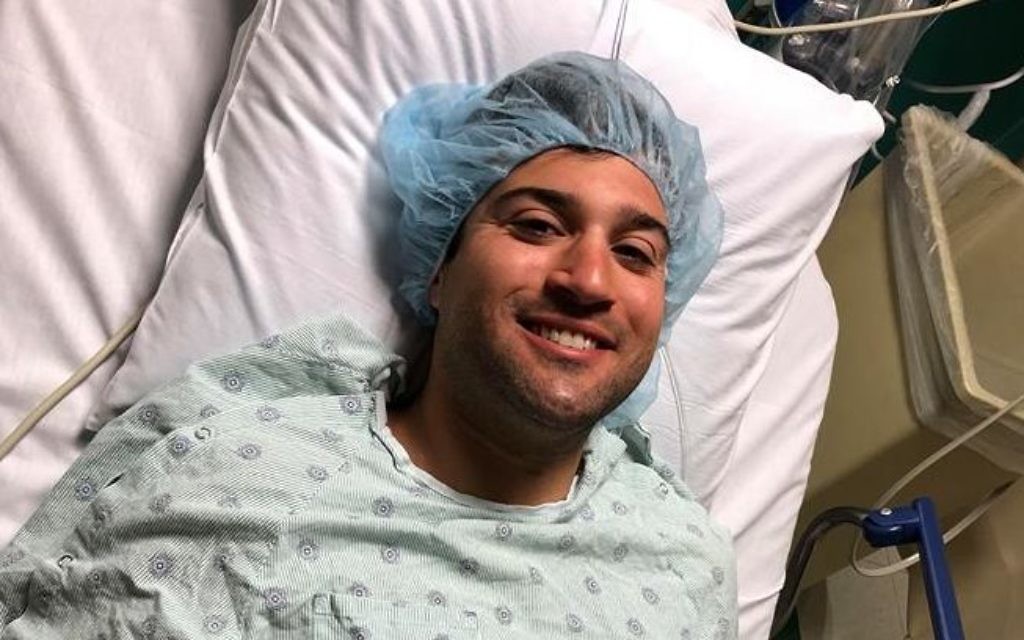Pain Worth Gain For Ben Levy After Donating Marrow
Attorney Ben Levy believes he has fulfilled Tikkun Olam after donating bone marrow to a relative.

Atlanta trial lawyer Ben Levy was about to approach the Kotel when his father, Robert, sent him a text, telling him that a relative was accepting the bone marrow Levy had donated weeks earlier.
Levy could not think of a holier place to receive the news.
When he received a call in late January that a family member had been diagnosed with acute leukemia, he knew he had to help. “It was a pretty easy decision to make,” Levy said. “I figured if this could save his life, there is really not much to think about but to just do it.”
Get The AJT Newsletter by email and never miss our top stories Free Sign Up
It usually takes months to find a match in a bone marrow registry, if it ever happens, so Levy didn’t hesitate when he was asked to get tested.
He got some blood work done, and it was tested at Johns Hopkins in Baltimore. Levy and the relative’s son were both possible matches, but after additional tests, doctors determined that Levy, 29 at the time, was a better candidate for the procedure than the son, who is in his early 40s.
Levy said he doesn’t know why bone marrow from a younger donor might engraft better, but the recipient’s age can be a factor. Because the recipient in this case is in his early 70s, doctors harvested bone marrow directly from Levy’s pelvis rather than draw and filter large quantities of blood.
“For a younger recipient, that may do the trick, but for an older beneficiary, they need the good stuff,” Levy said.
Weeks before the surgery Levy flew to Baltimore for chest X-rays and 16 additional blood tests.
During the procedure, Levy was placed on his stomach and given anesthesia. Doctors made nine puncture sites in his lower back and inserted needles, 3 millimeters in diameter, to poke into his pelvis about 100 times to withdraw the bone marrow.
Levy’s pelvis was punctured 200 times in total, nurses said.
“I didn’t want to know how painful the surgery was going to be because I was going to do it no matter what and I didn’t need anything to psych myself out,” Levy said. “I thought, ‘If it’s going to hurt, it’s going to hurt no matter what, and I will just deal with it when it happens.’”
After extracting the marrow, doctors immediately dripped it into the recipient. By the time Levy woke up from anesthesia, the transfer had been completed.
It took doctors about three weeks to learn that Levy’s relative was accepting the bone marrow.
Two days after the surgery, Levy flew back to Atlanta to begin the recovery. His mother, Sue, who served as his designated caretaker, accompanied him. He experienced some mild discomfort and had to take iron pills for anemia.
But he said the surgery was 100 percent worth it to save a life. “It’s such a small sacrifice that I would strongly encourage everyone and anyone to get their saliva tested to be part of a donor database, and if they ever get the call, they answer it.”
Levy said he still hasn’t gone to the gym and feels pressure on his puncture sites when lying on his back. “There were days after the procedure where I felt good and was full speed at work, but also days where I felt exhausted,” he said. “I quickly realized every time I feel good, that doesn’t mean I can go about my normal daily life. I still needed to take things a little bit slower, so I don’t overdo it.”
Levy attributes his latest soreness around the puncture sites to sitting for 11 hours on a plane for the return flight from Israel.
In addition to handling personal injury cases at Morgan & Morgan, Levy is heavily involved with the Jewish Federation of Greater Atlanta and serves on the Friends of the Israel Defense Forces board.
Donating bone marrow to save a life “sort of goes along with why I give to the Federation and the IDF. Those are causes I believe in, and giving lifesaving bone marrow is my way of doing tikkun olam,” he said. “It comes from my Jewish values, and it feels good to give. And in the end it’s not just the recipient who receives the gift. I also get a gift because I know I saved someone’s life.”




comments